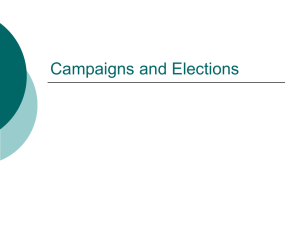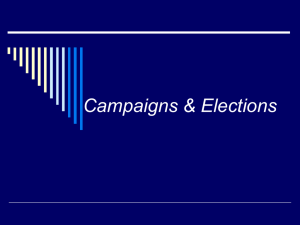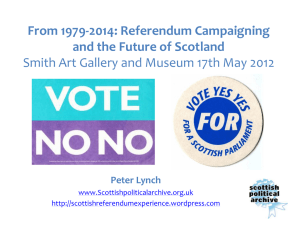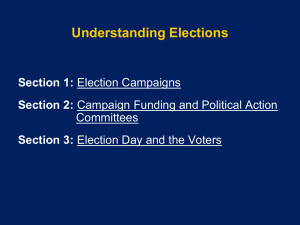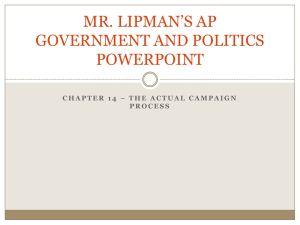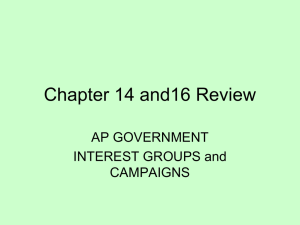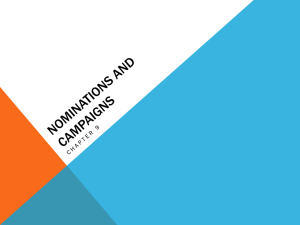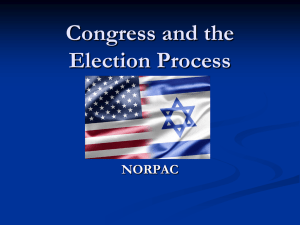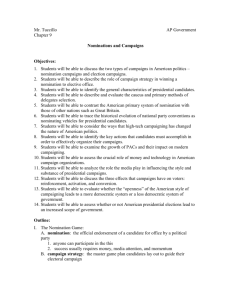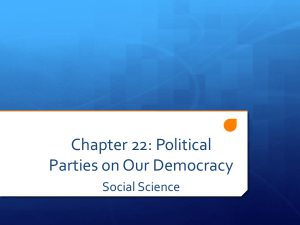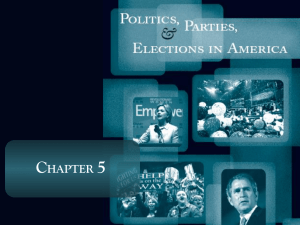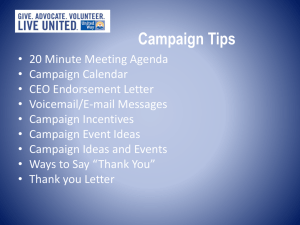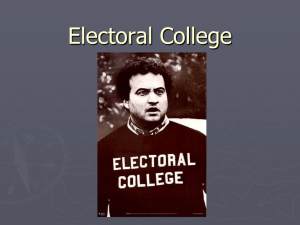Government in America, Chapter 9
advertisement
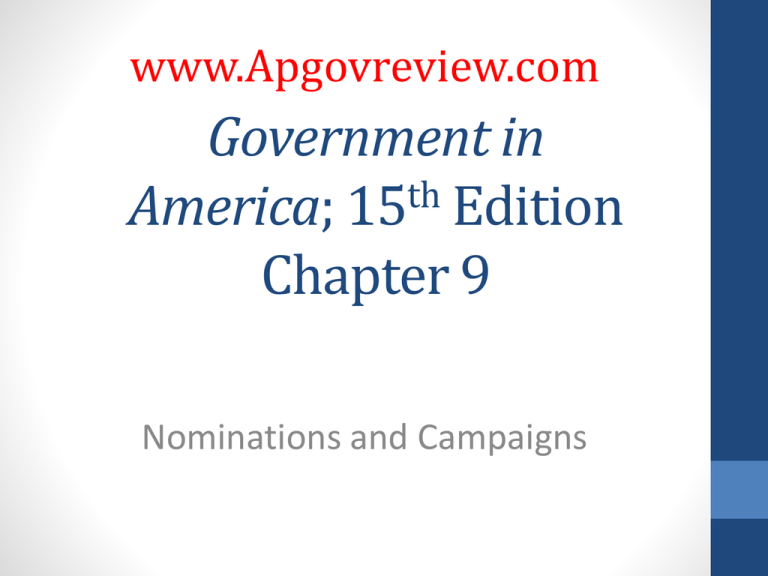
www.Apgovreview.com Government in th America; 15 Edition Chapter 9 Nominations and Campaigns The Nomination Game • Nomination – party endorsement for office • Campaign strategy – ways a candidate tries to win nomination • Deciding to Run: • Campaigns in other countries last two months • Presidential candidates in US campaigns for at least a year • Competing for Delegates: • National Party Convention – meets every four years; nominates president and VP, and creates the party’s platform • Delegates to the convention used to be chosen by political leaders • McGovern-Fraser Commission – helped allow for more input from public for Democratic Conventions (result of 1968 convention) • Delegate selection must not be done in secret – primary election or open meeting • Superdelegates – guaranteed to be delegates to the convention based on their position (member of Congress or member of national committee) • 19% of Democrats and 6% of Republicans • Can support ANY candidate The Nomination Game Cont. • The Caucuses and Primaries (dependent on each state) • Caucus – voters attend an open meeting to choose their candidate for president • Much more time consuming than primaries • Iowa caucus is the first step in the nomination process for candidates every 4 years • Campaigns could be made (Jimmy Carter, 1976) or broken here • As a result, Iowa receives a of of $ and attention during primary season • Presidential Primaries – voters go to polls to vote for candidates • NH is traditionally the first primary • Like Iowa, they receive a lot of $ and attention from candidates • Winning Iowa and/or New Hampshire helps build a candidate’s image • Frontloading – states moving primaries earlier to gain more media attention • a majority of delegates are chosen in the first 6 weeks of the season • As the primary season goes on, more and more candidates drop out - $$$ • Evaluating the Primary and Caucus System: • Criticisms include: too much attention spent on early contests, difficult for politicians to run and complete their duties, $ is too significant, voter participation is low, media is very powerful The Nomination Game Cont. • The Convention Send-Off • Prior to the Convention, there is virtually no doubt who will win the nomination • 38 million people (little more than 10% of population) watched Obama receive nomination in 2008 • In years past, virtually all delegates where white males over 40 • The weeklong convention (infomercial for the Party) • • • • Day 1: keynote speaker (2004) Day 2: Party Platform – outlines the goals and policies Day 3: nomination of the candidate The final step is the candidate giving his/her speech The Campaign Game • The High-Tech Media Campaign: • TV is most common way to reach voters • Internet is incredibly important – spread news and raise $ • Smaller donations, but many more people can be reached • Direct mail – potential supporters are targeted via mail and asked to donate • The importance of media: • Provides a source of advertisement, and “free” advertising via news • Half of presidential campaign $ is spent on TV ads • News coverage does not always focus on issues, but rather campaign details • Organizing the Campaign: • Requirements to run an effective campaign: • Campaign manager, fund-raiser, campaign lawyer, media expert, campaign staff – many young volunteers, research staff and advisers, pollster, press secretary, website……. • All of this costs $, lots of $ • Great Movie – Ides of March – George Clooney, Ryan Gosling, and CINCINNATI! The Campaign Game Cont. • The Maze of Campaign Finance Reforms: • Federal Election Campaign Act (1974): • Created the Federal Election Commission (FEC) – administers and enforces campaign laws • Created the Presidential Election Campaign Fund: FEC gives $ to candidates ($3 on tax returns) • Provides partial public funding for presidential primaries: matching funds - $250 for candidates that raise $5,000 in at least 20 states; candidates must limit spending to receive matching funds • Bush in 2000 refused matching funds • Provides full public financing for major party candidates in election: grant to candidates ($85 million in 2008) • Obama in 2004 refused the $85 million • Requires full disclosure of who contributes and how much $ • Limited contributions: limits individual contributions to campaigns ($2,300 in 2008) • Buckley v. Valeo: • SC ruled that individuals could contribute as much to their own campaign as they wish (Ross Perot spent $60 million in 1992) The Campaign Game Cont. • Soft Money – money not given to a specific candidate, but party expenses – no limits on contributions • McCain-Feingold Act – banned soft $ contributions and limited corporations and unions ability to pay for ads 60 days prior to an election • The second part was later overturn in Citizens United v. Federal Election Commission (2010) • 527 groups: • Independent groups that have no restriction on funding, provided they do not explicitly endorse a candidate (Swift Boat Veterans for Truth – 2004, Kerry; Moveon.org – 2004, Bush) • 501(c) groups: • Groups that can receive unlimited contributions and do not have to report them, provided no more than half of money spent is on political activities The Campaign Game Cont. • The Proliferation of PACs: • Political Action Committee (PAC): • • • • Can donate $5,000 per candidate in primary and general elections Interest groups can form PACs to support favorable candidates Especially influential in Congressional elections FEC receives reports of all PAC spending • Are Campaigns Too Expensive? • 2008 costs for Congress and Presidential campaigns? • $5 billion • .05% of the GDP • Why is campaign finance reform difficult to achieve? • Congress is hesitant to tie their own hands The Impact of Campaigns • 3 effects of campaigns on voters: • Reinforcement: campaigns can reinforce a person’s preference for a candidate • Activation: campaigns can get voters to get involved by spending $ or volunteering • Conversion: campaigns can change voters’ minds • Out of the 3, campaigns most often do NOT convert voters • Selective Perception – paying attention to issues that people agree with or are interested in • Buying a car – see that car everywhere Understanding Nominations and Campaigns • Are Nominations and Campaigns Too Democratic? • In most countries, nomination is still controlled by a select few • Many unknowns can, and do, become president (Carter, Clinton) • Some believe America is in a “permanent campaign” • Some Americans suffer paralysis by analysis and do nothing • Do Big Campaigns Lead to an Increased Scope of Government? • Campaigning can lead to many more promises • Farm subsidies in Iowa • These promises increase the involvement of federal government in local affairs Quick Recap • Primary vs. caucus • Delegate vs. Superdelegate • Importance of image during primaries • Role of Media in Campaigns • Federal Election Commission • 527 groups • 501(C) groups • PACs • Benefits and weaknesses of American campaigns vs. other countries Thanks for watching! Subscribe to my channel Help spread the word • Questions? Comments? • Leave in comments
